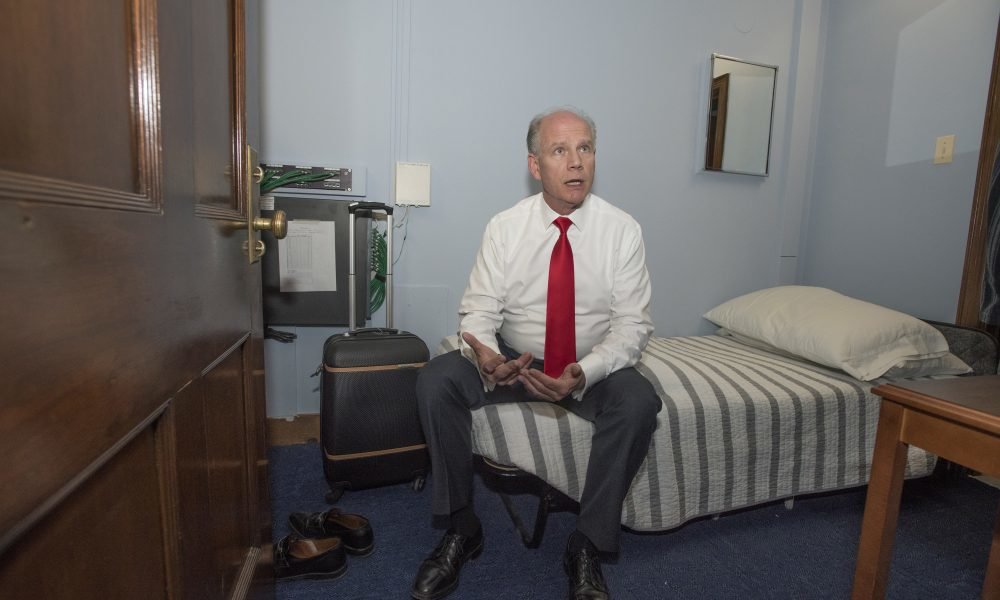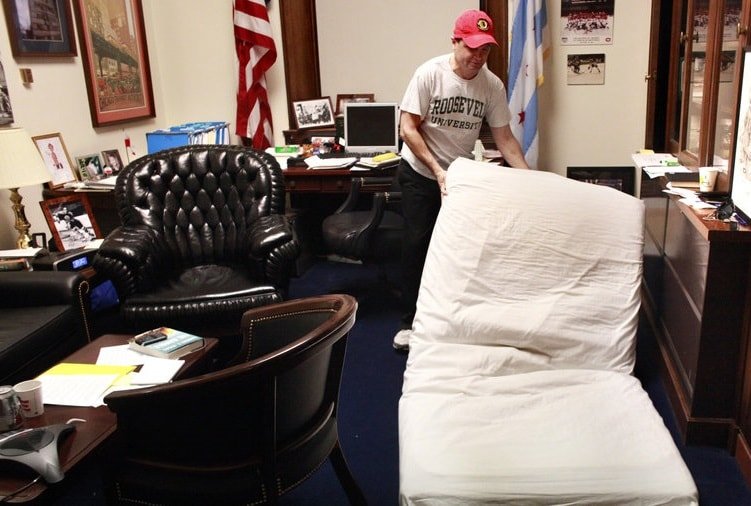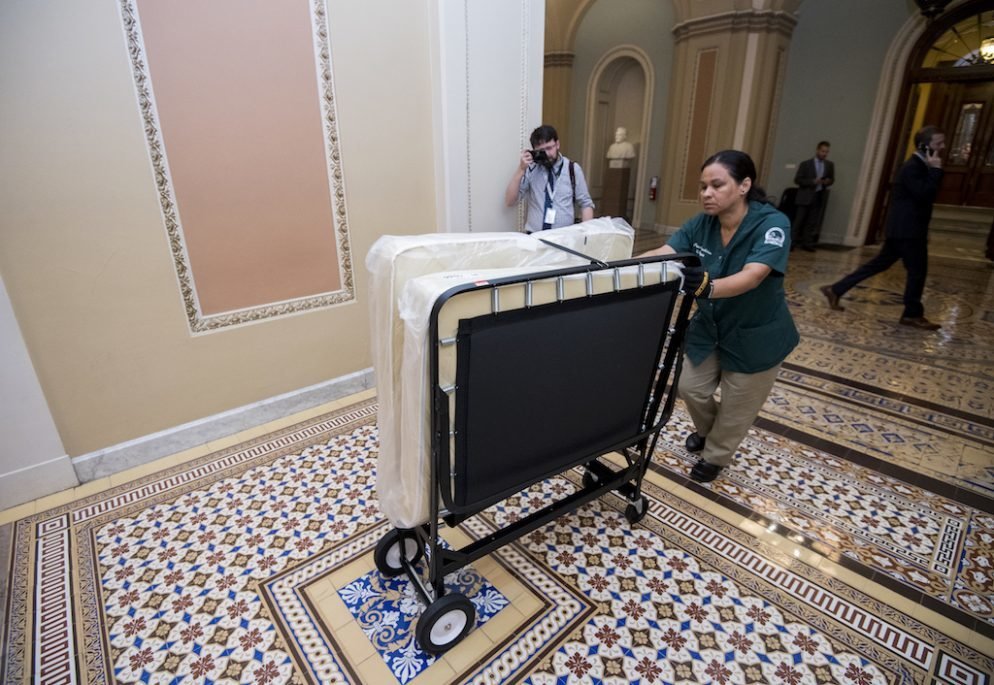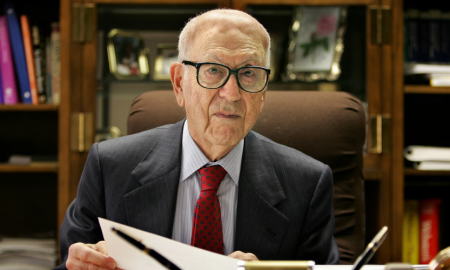
Lawmakers Sleep in Their Offices Because of High Living Costs

Congressmen with meagre money
Being a lawmaker in the US doesn’t automatically translates to huge financial possession. Some lawmakers cannot afford to pay for house rents so they resolved to sleeping in their offices, and they claimed they have the right.
Most of them used poverty as a factor, especially since Congress wages remain unchanged for close to 10 years and the expensive lifestyle in Washington are the orders of the day. The population of the congressmen who are now official sleep-in housemates is on the increase. They make their beds with anything they deem comfortable in their offices, like couches, cots stuffed inside wardrobes, sleeping bags, futons laid at the back of their constituent chairs, and so on. All these attempts just to cut down on expenses and avoid dipping too much into their wages.

Close to 100 lawmakers are sleeping on cots in their workplace because the standard of living in DC is neck-breaking
In the past before coming into the House, most congressmen were receiving extra allowances meant to settle some of their daily costs, during their service terms in their local Congresses at the state level. Other big cities like Sacramento in California have their allowances per day increased to $184, while $190 is being given to Austin lawmakers in Texas.
On the other hand, when they joined the US House, their salary went $174,000 annually, which has been the same amount since almost 10 years now, and it doesn’t come with a bonus for an apartment. Nonetheless, these reps work and live somewhere that one-bedroom home costs at the minimum $2,000 per month.
The accurate number of those doing this has not been compiled yet, but some were interviewed by journalists and they confessed to using offices and the gym at the Congress building to take their shower. A rough calculation indicates about 100 lawmakers. Close to 50 congressmen owned up openly.
Here are some examples of lawmakers who fall into this category:

As economical as the idea of spending the night in the office may sound, some fellow lawmakers find it pretty annoying and they are clamoring for such practice to be stopped
Dan Donovan (Republican-SI)
Donovan complained that the living cost is very high in Washington. He attributed his ability to carry out his legislative responsibilities to the folding bed inside his office which he lays on every night, at the same time, afford to settle his apartment expenses in New York City.
He said only wealthy lawmakers can afford to pay for rent or purchase apartments in DC, although he knew that the forefathers in America didn’t mean for things to go this way.
Zeldin (Shirley)
This politician is a veteran in the army. He said he feels much stronger and adequate when he sleeps on the cot he places inside his wardrobe in the office. He thinks the training he received as a military man back then is what he’s depending on, and he doesn’t get distracted once he’s around his workplace, from sleeping time to working time.
Tim Walz (Democrat-Minn)
Like Zeldin, Walz is also a veteran from the American army and a former teacher. He explained that he once rented a house in Washington in collaboration with former US representative, Patrick Murphy, a Democrat. Both lawmakers pay roughly $1,800 each per month. However, things took a new turn when a bid in the House in opposition to Marco Rubio was lost by Murphy in 2016. This unfortunate incidence led to Walz sleeping on a cot while at the workplace.
The office of a congressman is designed such that a kitchen or bathroom are not included. There is a reception corner, a squeezed area to work left out for a worker and another office set apart for the congressman, completed with one seating corner and a table.
However, sleeping over here is made easy because of the gym provided in the Capitol Hill for lawmakers only, situated at the Rayburn House Office Building storage area. The members can use the laundry, showers and personal lockers for a $300 fee every year.
On a normal morning, the squatters start their day folding up their substituted beddings, then move down to the gym for their early morning exercises. Afterwards, they would take their shower. Most times they dress up right inside the shower area. These activities should be done before 9 a.m.

The sleep-in legislators use the congressional gym bathroom to shower and set up temporary beddings in their offices because their salaries have not increased in almost 10 years
However, a bill has been scheduled for passage in the Congress in May, and the bill will contain a proposal to ban such activities. Congressmen and political officers would be forbidden from transforming their office areas into a provisional lodge, with the argument that such endeavor breaches the regulatory tenets of the Congress and IRS.
A Democratic lawmaker from Mississipi, Bennie Thompson, is one of the members clamouring for the proposed act. He calls the situation unhygienic, unethically improper and dirty.
Some of the points he raised to buttress his argument is that these men use electricity, security, cable, and janitorial, all free of charge, with zero rent. Thompson estimated the cost of everything to be between $25,000-$30,000 per annum and such debt will not be taxed.
Walz and others, however, suggested that rather than increasing the wages for the lawmakers, the House should transform the hostels used sometimes ago to house lawmakers into a complete lodge for the Congressmen.
More in Advisor
-
`
Homeownership vs. Real Estate Investment: What’s Better?
Homeownership has long been seen as the American dream. But today, more people are asking: Is it really the smartest way...
October 3, 2025 -
`
Why the Armani Fashion Empire Is Set for an IPO
Giorgio Armani, one of the most iconic names in global fashion, left behind a detailed plan for the future of his...
September 27, 2025 -
`
Why Do Pokémon Cards Outperform the S&P 500 As an Investment?
Pokémon cards have outperformed the stock market by a mile. Since 2004, they have delivered a staggering 3,821% return, according to...
September 27, 2025 -
`
America’s Billionaires Get Older—Millennials Wait for Wealth Transfer
Many of today’s billionaires don’t match the youthful tech-founder image often portrayed. While names like Elon Musk, Sam Altman, and Mark...
September 21, 2025 -
`
Can President Trump Legally Fire Fed Governor Lisa Cook?
Lisa Cook is right in the middle of one of the most explosive legal battles in Washington. President Trump wants her...
September 20, 2025 -
`
Jeff Bezos’ Advice for Millennials Who Want Financial Success
Millennials today have grown up in a world where instant access to products and services is the norm. From two-day deliveries...
September 13, 2025 -
`
Maison Margiela’s First-Ever Celebrity Campaign Stars Miley Cyrus
Miley Cyrus just changed the rules again. In August 2025, she became the first celebrity ambassador in Maison Margiela’s 37-year history....
September 12, 2025 -
`
Should You Rely on AI for Financial Advice? Here’s What Financial Experts Say
AI is everywhere right now, and yes, that includes your wallet. From budgeting to retirement planning, tools like ChatGPT, Google Gemini,...
September 6, 2025 -
`
95% of Businesses Report Zero Returns on In-House AI, MIT Study Shows
U.S. companies have funneled an estimated $35 to $40 billion into internal AI projects. Yet according to a new report from...
September 6, 2025















You must be logged in to post a comment Login